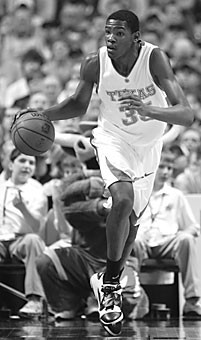One year better than nothing
margin:2px; padding:2px;””>
For every Kobe Bryant there’s a Korleone Young, for every Kevin Garnett a Leon Smith, and for every Amare Stoudemire a Kendrick Perkins.
Although Bryant, Garnett and Stoudemire became NBA superstars after entering the NBA straight from high school, Young, Smith and Perkins chose to forego their college eligibility and didn’t exactly pan out.
With the rule enacted this season forcing all high school players to wait one year before being drafted, the Youngs, Smiths and Perkinses who think they are ready for the NBA will realize one thing – they are not.
In turn, the rule makes the college game more exciting by infusing it with stars like Ohio State’s Greg Oden, Texas’ Kevin Durant and Arizona’s own Chase Budinger, even if for just a year in the likely case of Oden and Durant. While these studs increase their marketability by having ESPN give them hype all year, they also learn some of the fundamentals missing at the NBA level.
The stars also help schools generate what matters most in college sports: revenue stemming from the schools’ increased winning percentage with them leading the way.
Although this hurts the mid-majors who have less of a chance of competing consistently with major schools’ major stars, do you think Ohio State would have gotten to the national championship game without Oden? Would Texas have earned a No. 4 seed without Durant?
Arizona might not have even made the NCAA Tournament this season if Budinger had pulled a Ndudi Ebi and declared for the draft after committing, leaving the school with no suitable replacement and even less depth.
Ebi, a power forward who decided to become the No. 26 pick in the 2003 NBA Draft instead of a Wildcat, did just that and has become the poster boy for the one-year rule.
He never made an impact in the NBA and is now out of the league.
Had the rule been in place, Arizona likely would have had a developing force at power forward in its 2005 Elite Eight run, and Ebi might still have a future with the NBA.
Although there’s no question the league would be better off with a two- or three-year rule to allow programs to build more of a team and give players more time to develop, having these guys for one year is better than nothing.
– Michael Schwartz
assistant sports editor
One and done players hurt programs
margin:2px; padding:2px;””>
With NBA’s age rule now in effect, the fall of college basketball has officially begun.
No longer will programs be able to build a championship team around players who are committed to the maturation process of the squad. Men’s hoops has now become a one-year race to the championship.
The programs lucky enough to recruit NBA-caliber players – who are forced to play one year of college ball – have a single year to win it all. If the team is unsuccessful, they have nothing to fall back on because the foundation of the team split to the NBA.
Texas Tech head coach Bobby Knight got it right in a Big 12 Conference call: “”It’s the worst thing that’s happened to college basketball since I’ve been coaching.””
Players planning on leaving the collegiate level after their freshman year can decide to skip class during the second semester simply if they feel like it.
As long as the player earns sufficient grades during the first semester of college, he would no longer have to attend class during the second semester to play the entire basketball season. It’s selfish, but at least some will undoubtedly go that route.
And as Knight said: “”That, I think, has a tremendous effect on the integrity of college sports.””
Even in the midst of another one of Knight’s famous rants on his perspective of sports, the guy has a point.
Not only do the players have no sense of commitment to the team once their year is up, now there is no longer a need to stay committed to school.
Jim Rosborough, associate head coach of the Arizona men’s basketball team, told the Arizona Daily Wildcat he feels that players should have a right to make their own decisions out of high school and that “”it’s a horrible rule.””
“”Go quote Bob Knight and put my name underneath it,”” Rosborough said.
Well, you can add my name to the list as well.
– Ari Wasserman
sports writer









